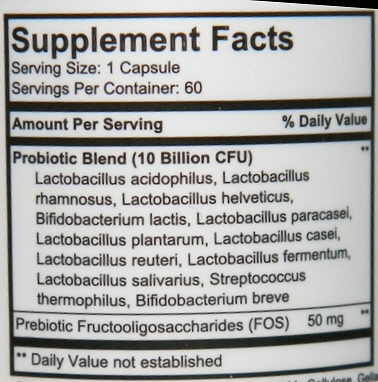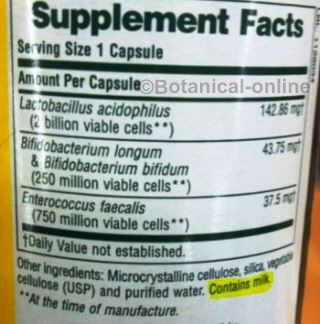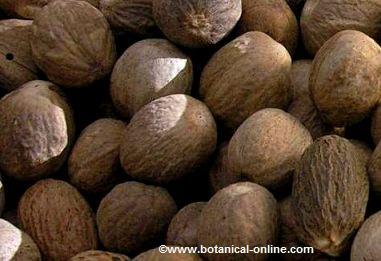Contents [show]
The best probiotic supplements for intestinal microbiota
WHAT ARE THE BEST OR MOST RECOMMENDED PROBIOTIC SUPPLEMENTS
What is a good probiotic supplement?
Probiotic supplements are capsules containing live microorganisms and, if taken in certain quantities, they have shown to improve the composition of the microbiota or gut flora and provide health benefits.
A good supplement is that one that has shown beneficial effects in studies for certain health conditions. Advice and assessment of a doctor is always recommended.
What to expect from a supplement? Which one should be recommended?
 Misleading advertising in a supplement. The number of bacteria should be measured in billions. Misleading advertising in a supplement. The number of bacteria should be measured in billions. |
Today there are many types of supplements on the market but not all probiotic supplements are equally effective.
An inexperienced person may get confused and buy a supplement with probiotics inappropriate or ineffective, it may even be contraindicated.
What characteristics must have a good probiotic supplement? What is more appropriate?
A good or effective probiotic supplement must meet different characteristics, which can be summarized in the following points:
– It must contain a type of bacteria that have proven beneficial for the situation required
– It should contain an adequate amount of bacteria
– Viable bacteria, that is to say, intact when arriving in the intestine, where they exert their effect.
* Attention to excipients and potential allergens.
Supplements with beneficial bacteria or strains
The word “strains” refers to types of bacteria that have been proved to be beneficial. Some supplements contain strains which have not been proven to have health benefits in humans.
Different species of Lactobacillus and Bifidobacterium(known as “bifidus”) are generally used, because it has been found that certain strains of these species improve intestinal health.
If probiotics are consumed as adjuncts to treat a particular disease, it is best to be advised by a doctor to determine whether there are new studies testing the efficacy of certain types of bacteria specifically for that disease.
If you take probiotic supplements for a disease or symptoms, consult your doctor what kind of bacteria is the most recommended. |
For example, for the treatment of Helicobacter pylori, it has been shown effective as coadjuvants in the treatment for eradication of bacteria: Bacillus clausii (2 × 109 spores, 3 times daily), or Kefir (250 ml, 2 times daily).
For the latest developments in studies, you should consult the latest information from the World Gastroenterology Organisation (WGO).
The supplement must contain sufficient bacteria
This point is very important since there are big differences between different types of probiotic supplements in the number of bacteria they posses. Even products such as sports or nutritional supplements incorporate into their shakes or powders certain amount of probiotics. But are they really effective?
Many supplements contain insufficient amounts of bacteria to produce their expected effects.
Is it too much ten thousand bacteria in a supplement?
It depends on what you want to use this supplement, but overall, 10,000 bacteria is a small amount for a probiotic supplement.
Although ten thousand units may seem a high amount of bacteria, they are very few.
Keep in mind that in our gut there are a hundred billion microorganisms (1014). By comparison, 10,000 bacteria (104) is an insignificant amount and a supplement with these characteristics is unlikely to produce any effect.
How many bacteria should take a supplement?
In all studies in which probiotics have proved beneficial, there have been used amounts of between 109 and 1011 spores or bacteria number.
These recommendations are especially suitable for people who want a specific effect to treat a disease or certain symptoms. (Consult your doctor)
READ SUPPLEMENTS LABELS To ensure a effective supplement, you should ask that contain a number of bacteria in 109 approximately equivalent to 1,000 million bacteria. |
Bacteria reaching the intestine must be viable
Most probiotic supplements are enteric coated or so as they are released directly in the intestine in order that the stomach acids do not destroy the bacteria they contain.
For the same reason, supplements should not be chewed.
This can be found on the labels of supplements when they specify that provide certain amount of viable bacteria, referring to their preparation to arrive intact to the intestine, where they exert their effect.
Enteric coated capsules are recommended or those containing viable bacteria. |
Furthermore trademarks usually add prebiotic supplements to their probiotics. Prebiotics are fibers with high fermentative capacity favoring the colonization of these bacteria in the intestine and therefore you might expect greater effectiveness of the supplement (FOS -Fructooligosaccharides, pectins, mucilages, other soluble fibers, etc.). Prebiotics, to have better effectiveness, should be taken with plenty of water.
View excipients and allergens
Many probiotic supplements contain undesirable excipients such as lactose, sorbitol or artificial sweeteners which are added to improve the taste but they are not recommended, especially in drinkable probiotics or in those in packets,.
We should also pay attention to allergens such as soy protein, milk, gluten, etc. It is relatively common for many supplements to contain milk because probiotics can be grown in dairy media.
EXAMPLES OF LABELS OF PROBIOTICS SUPPLEMENTS
 – This probiotic supplement provides a suitable amount of bacteria: bacteria 10 billion (1014). – It also contains prebiotics to improve the colonization of these bacteria (FOS or fructooligosaccharides). It should be consulted on the ingredients that did not contain unwanted excipients or allergens. Probably it contains milk. – It does not specify what amount of bacteria of each type it contains. This is a negative aspect of the labeling, because it may not have enough bacteria of one of the strains. |
 – This may be a suitable probiotic supplement because it contains a suitable amount of bacteria: 2 trillion (2 x 1012) 250 000 000 (25×107) and 750m (75×107). With this supplement a high amount of bacteria is obtained, efficacy can be expected. – Ensures that they are viable quantities of bacteria (“viable cells”), probably it contains enteric-coated capsules that resisten the stomach and reach the intestine bacteria without the stomach acids destroy them. – Alert with allergens, it contains milk (not suitable for allergic to milk). |
HOW TO BUY A GOOD PROBIOTIC SUPPLEMENT
Are best supplements those included in powder or in capsules?
Both types of supplements may be suitable. Capsule probiotics, if they contain a good amount of probiotics, can better withstand stomach acids and reach much more bacteria into the intestine.
The problem of drinkable probiotics is that they usually contain undesirable excipients such as lactose, sorbitol or artificial sweeteners which are not recommended.
Another possibility are the vials, which are usually used in pediatrics, for children who can not swallow capsules.
How to keep probiotics?
Probiotics generally should be stored under refrigeration.
*Related information:
– Importance of Diet: Prebiotics
![]() More information on probiotics.
More information on probiotics.








